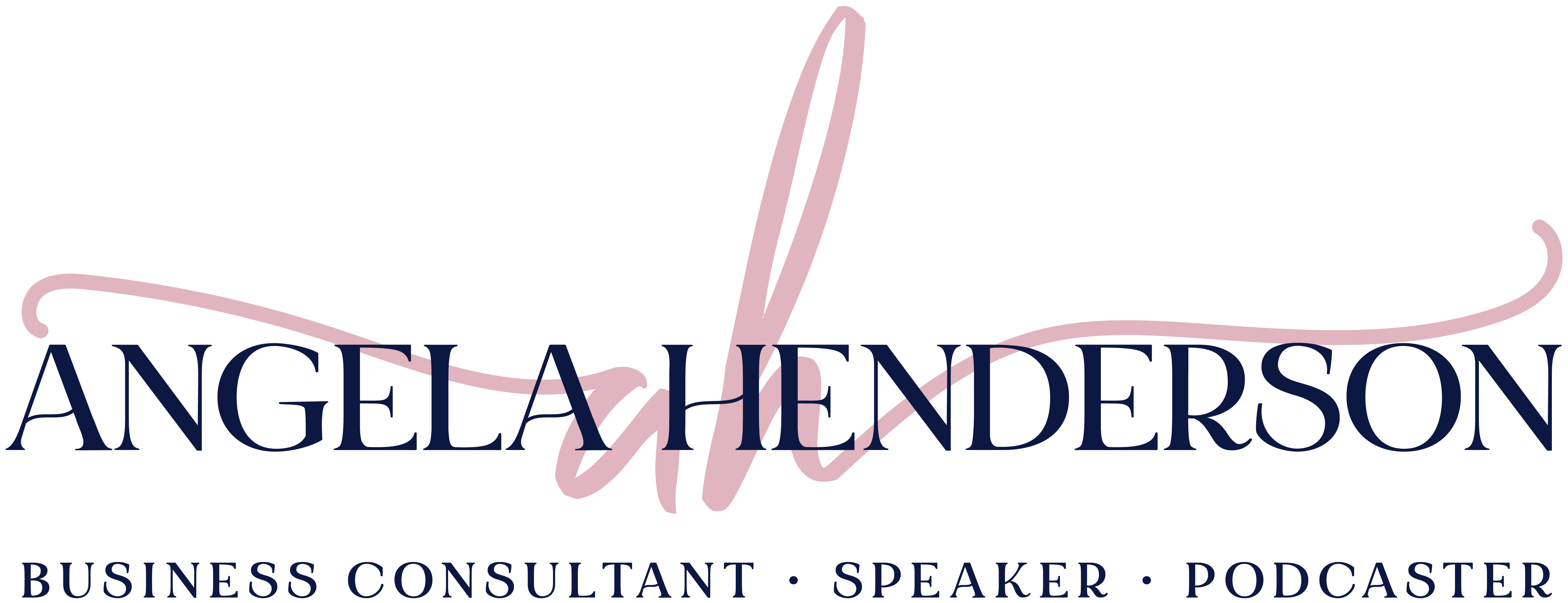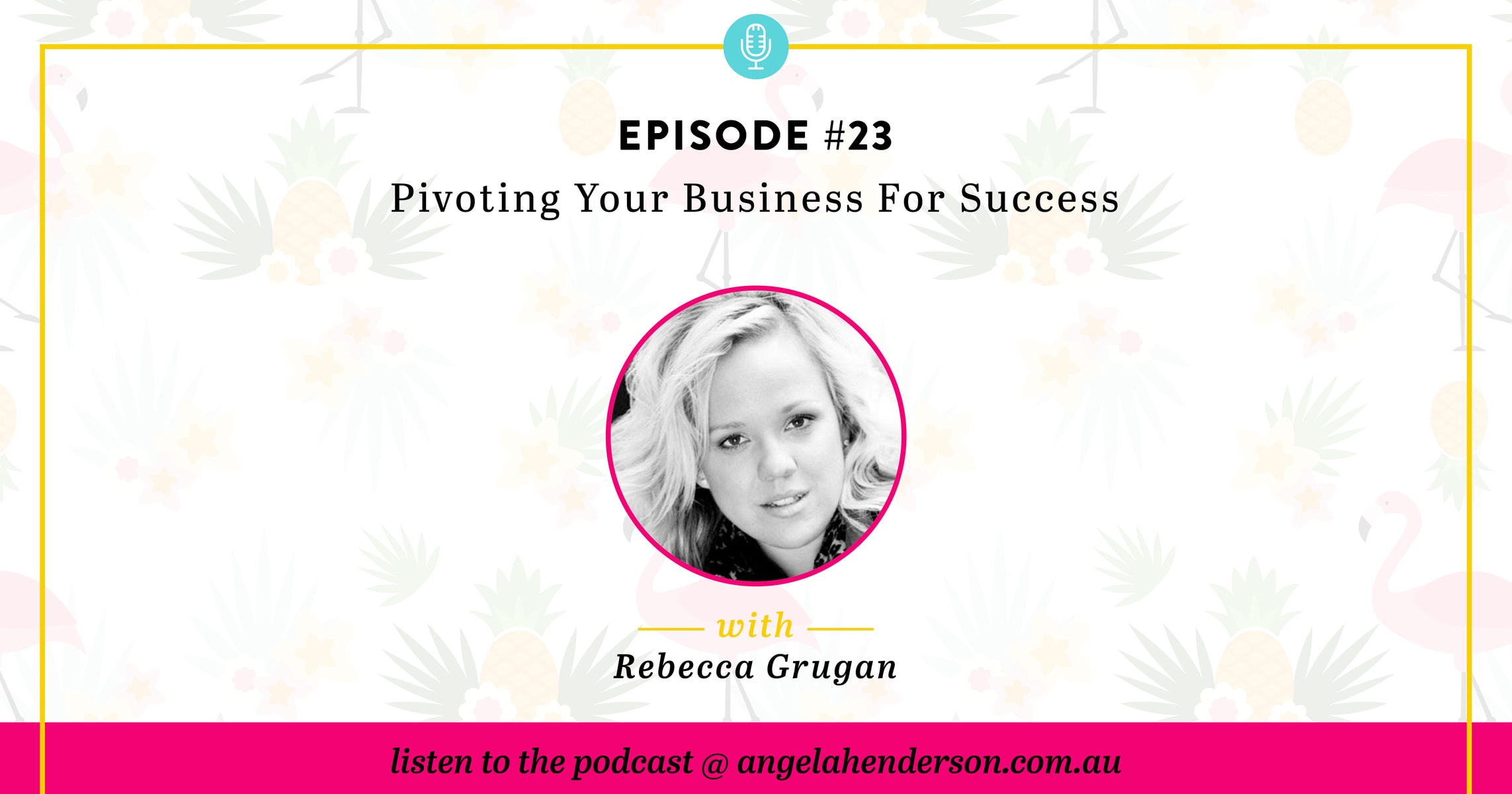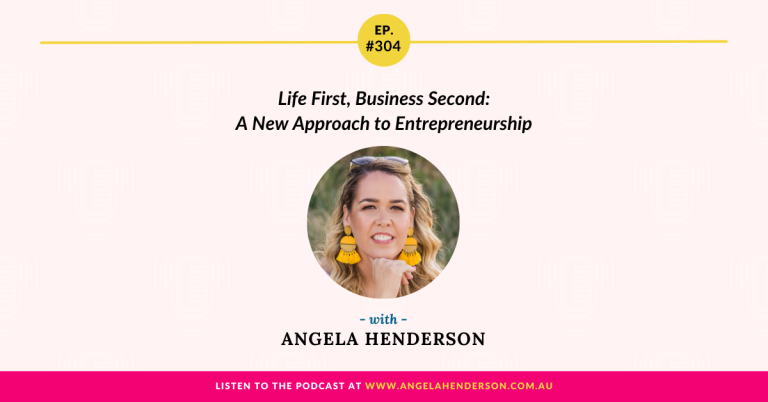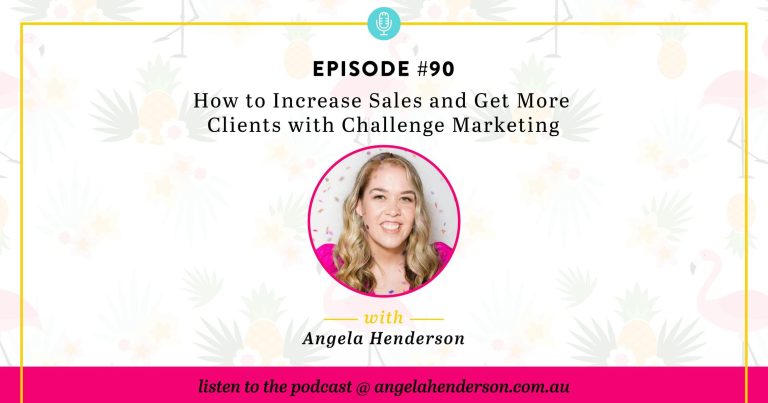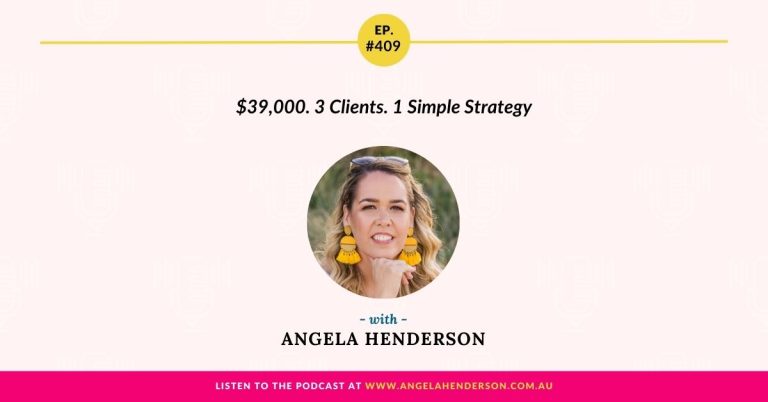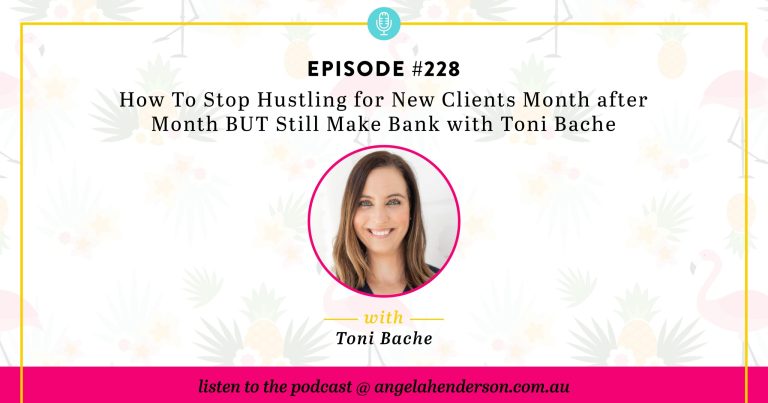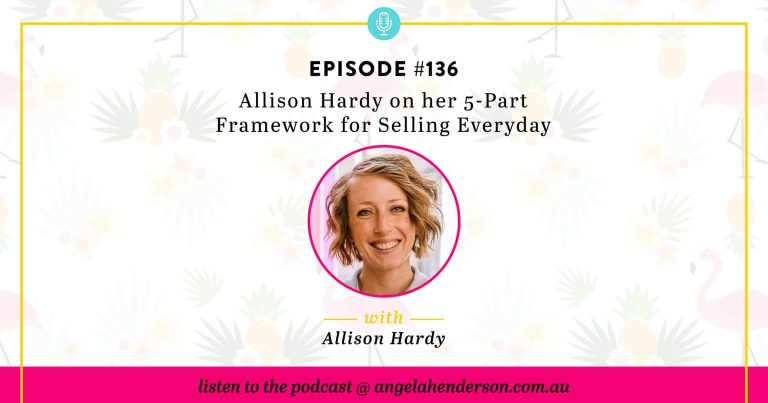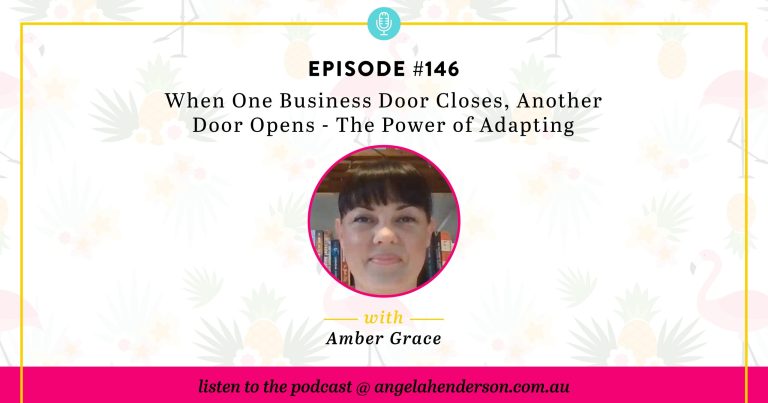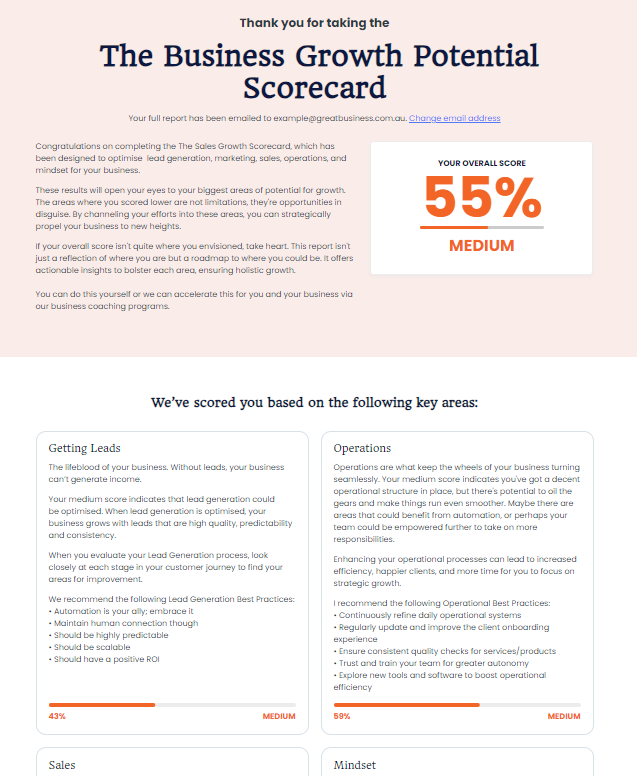Running a business can be very challenging and in this episode, Rebecca Grugan of I AM Montessori shares with us how our choices can affect the businesses we run. Being flexible, open minded and okay with change can be a positive thing when pivoting your business. Change is inevitable and learning to be okay with it, especially when handling your business, may give you opportunities that you wouldn’t have imagined.
Important Links Mentioned in the Show:
Angela Henderson Active Business Facebook Group
Angela Henderson Facebook Business Page
Prefer to read Pivoting Your Business For Success? Here’s the transcript:
ANGELA:
You’re listening to the Business and Life Conversations podcast, with Angela Henderson, episode 23.
Hey there, you’re listening to the Business and Life Conversations podcast, my name is Angela Henderson, and on this show we talk about improving your business, life or both. By having amazing and rich conversations with brilliant guests. Who will inspire you and who will give you tips and tricks, to help you grow both in life and in business.
Hey there amazing business owners, Angela here, and welcome to another episode of Business and Life Conversations with Angela Henderson. I hope your day is going brilliantly well and that you’re ready to listen to another amazing episode of the Business and Life Conversations podcast.
I’m really, really excited to have you on the podcast today because I’m talking to someone who I’ve known for a while and seen her go from strength to strength. This person I’m talking about is Rebecca from I AM Montessori, here in Brisbane, Australia.
What I love about Rebecca is that she’s always looking for the positives. She believes that life is made up of a series of choices. Choices only we can make and that we are exactly where we are based on these choices. And ultimately for Rebecca, she chooses to be happy.
On today’s episode, we’re going to be taking just about that, choices. But more importantly, making choices about pivoting your business for success, learning to be okay with the business starting out as something and morphing into something else, and remaining open minded during this process.
Welcome to the show, Rebecca.
REBECCA:
Thanks for having me, Angela.
ANGELA:
Yes, how are you? Now you are a Brisbane based girl also, so how’s your day going so far?
REBECCA:
Yeah, really good. Really good, weather is good here.
ANGELA:
We do live in luxury so we are very, very good with that. Now listen, we’ve known each other for a few years now, but unfortunately, I think the last time we connected was by fluke at a park, right before you were about to have bub number two, I believe.
REBECCA:
Absolutely.
ANGELA:
Other than that we haven’t connected, but we’re friends on Facebook. I see what you do, you see what I do. And so it’s amazing to be able to reconnect for the podcast, because you are just going from strength to strength with I AM Montessori. So before we get started though about digging into about I AM Montessori and how to pivot your business and choices, I want to know what your favourite movie is. I like to start off with something fresh and light for the audience.
REBECCA:
Absolutely. Growing up and probably still to this day, my favourite movie would be Remember the Titans.
ANGELA:
Okay.
REBECCA:
I played a lot of sport when I was younger and it had a message in that still resonates for me now in business as well. But even when I had my two children, the lullaby song, you know, I would sing to them was that “Nah, nah, nah, nah, hey, hey, hey!”.
ANGELA:
Yep.
REBECCA:
And then recently The Greatest Showman, I’ve watched three times now and I … I never thought I would like a musical, but yeah, both of them.
ANGELA:
Both of them. They’re your go to. So yeah, with The Greatest Showman, high reviews. Something I’ve yet to watch but I don’t know a single person who has said a single bad thing about the movie, would you agree with that?
REBECCA:
A hundred percent. I watched it the first time drunk, very, very drunk. And it was awesome so the second time was even better so it is … The message is, yeah. It’s … I would watch it with any aged child, it’s life changing for me.
ANGELA:
Well that’s good, because Finlee, my soon to be nine year old, at the time of this recording he is eight, he will be nine tomorrow. So by the time people listen he will be officially nine, and he keeps asking me, “Mum, will you let me watch it? Will you let me watch it?” And I haven’t done enough research to know, so that’s good to know that you’ve given me the tick of approval. That it’s okay for him to watch it.
REBECCA:
Yeah, absolutely.
ANGELA:
Now listen, tell the listeners a little bit about who you are, how you started the business and where you’re at today with business. So, we have a clear understanding about who Rebecca is.
REBECCA:
Too easy. I’m 32, live in Brisbane, born here. Started I AM Montessori five years ago. My neighbour gave me a book on Montessori when my first child was one and three months later I started the company. I got my first investor from the local bowls club, because he’d just sold his business. And I wanted to change education. I’ve always been in business, I should say. My first ever business when I was 17 was Fashion Weekly and I sold that in 2011. And then started a PR and marketing business for small businesses and then yeah, I AM Montessori was just an idea that I took and went with it.
ANGELA:
You’re rocking and rolling. Because you started off with one facility or centre, you could say. And now you’ve got how many different centres?
REBECCA:
So I started off with like a play group, parent child classes that they would pay to come and learn about Montessori. And then in October, 2016 I started our first childcare centre at Alex Hills, which is a 64 place, long day care centre. And then I’ve just taken on my second centre July, this year, 2018. And I also had a family day care scheme which I’ve recently made the decision to close. So three services approved by the government. We’re affecting about 400 families a week.
ANGELA:
Through the I AM Montessori. So for those that are listening, those that aren’t all over the Montessori element of education. But can you just give them a little tidbit, just a quick few sentences about what is Montessori. What’s the difference about it?
REBECCA:
Yeah, Montessori is child-led, it’s a prepared classroom and children work more so independently and individually, rather than in groups. So, if a child is interested in mathematics and that’s their strength, they can do that. Or if they’re creative, they’re not held back from art and have to wait until two o’clock on a Thursday to be able to do what they’re good at. So lots of entrepreneurs, successful entrepreneurs came out of a Montessori early childhood education. Maria Montessori, she was from Italy and the philosophy is over 110 years old.
ANGELA:
So how cool is that? Again, like you’re saying, it’s child-led, kids get to kind of rock and roll wherever they feel for the day, what their strengths are. Obviously there’s still some guidance from the adults and the educators that are in the room, but they’re not being told or dictated, “You must sit, you must do this, you must do that”. It’s again, really nurturing their creativity, their imagination and allowing them the opportunity to rock and roll what they feel like they want to do. Is that right?
REBECCA:
Absolutely. There is limits within, there’s boundaries, it’s not just free for all, but yeah. For me, it’s modern education. It’s what we need our kids to have.
ANGELA:
I know with Finlee my almost nine year old, he has ADHD. So one of the biggest things, especially I see in boys, just the way that their brain develops and all my mental health skills coming in I guess, is that he says, “Mummy, sometimes I just need to go outside. That’s all I need, I just need a five minute break to go outside. My brain … “, he goes, “It stops working, Mum”. He goes, “It’s just like I can’t listen anymore. So then I look outside, but then I get in trouble for looking outside. But all I really wanted to do is just play for a minute, that’s all, Mum”. And you know, there’s so much to be said I think about the value of play. I think people underestimate play, like, “Oh, the kids are just playing”. But play is where creativeness comes from. They’re able to problem solve, there is so much wealth in play, but yet it isn’t obviously really looked upon in that formal education setting.
REBECCA:
Absolutely. Well Maria Montessori would say, “Play is the work of the child”.
ANGELA:
I couldn’t agree more.
REBECCA:
So, you know, play is not just in the playground. Play should be how they’re learning numbers and letters and everything in life. It should all be play.
ANGELA:
And do you find in Brisbane in particular … We can’t probably talk about the world, but obviously, is it easier to do the I AM Montessori type of philosophy when they’re younger? And then what happens when they get to like high school? Is it the only options we have in Brisbane or in Australia really like that formal education? Or what happens?
REBECCA:
There’s in Queensland … So Brisbane has got Brisbane Montessori School that currently goes to grade ten, and then you’ve got Montessori International College on the Sunshine Coast, goes till grade 12. They’re really your only options in our direct area, but yeah. I would say for me there is going to be more and I will have an entrepreneur high school in Brisbane in the next couple of years.
ANGELA:
Yep.
REBECCA:
So it’s changing.
ANGELA:
Yay. So exciting for you. We could probably just keep talking and talking, but I’ll pull us back to what we’re talking about. And really that is about businesses pivoting their business.
REBECCA:
Yeah.
ANGELA:
But before we explore how you have pivoted your business, I just want to talk about the listeners who might be out there going, “Well, that’s a jargony word. What does that mean, Angela?” So I just want to make sure that we’re all on the same page, and really, for those of you listening, pivoting is super simple. It means changing your business model until you can prove that it works, that it is providing revenue for success. Sometimes pivots are major shifts and other times it is a small change that can produce sales results enormously. So, it just really, if you just think about it as just changing the direction of your current model.
An example I can use is that I, too, am currently pivoting my business. I’m moving away from a one-to-one model because this model means I can only help a limited number of women in business, and I’m now introducing my one-to-many model by creating an eight week, business coaching program called Profit Pillars. And this particular model will allow me to work with 50 or more women at one time, while at the same time scaling my business for future growth and success. So even though it’s something that sometimes you might not want to do, the feedback that your clients give you, or it’s just not working for your family life anymore, it means you’ve got to look at what you’re currently doing and where you want to go.
So I just wanted to bring everyone back so we’re all on the same page about pivoting. So for you Rebecca, since you’ve been in business, how many times have you pivoted, big or small? And what does that look like?
REBECCA:
Thousands, thousands, definitely thousands in five years.
ANGELA:
Yeah.
REBECCA:
There’s probably four major shifts that have happened in the five years. So when we started, we started as parent child classes and also selling materials that I imported directly from China. They were the two biggest issues we had, parents were on wait lists for years to be able to get their children into Montessori, so they were at least able to come and learn about it and how to do it at home. But also materials were so expensive. Something that I would sell for $14.95 was $104.00 before I started bringing it in.
ANGELA:
Yes.
REBECCA:
So you know, that’s how we started and that was what was in my business plan to start with. There was no other … Childcare was never a thing that I would ever have thought of doing, or opportunity that came up. And then I had a call to start a childcare centre for somebody, for a group. And I go with the whole Richard Branson, “If you don’t know, just say, “Yes”, and you’ll work it out later”.
ANGELA:
It’s the best way to go sometimes.
REBECCA:
Oh, definitely. So I wasn’t Montessori trained but I hired a Montessori teacher and I learned and enrolled and did my own study on it. But I always hired in the skills I didn’t have, which is what I did when we took on that centre. So we successfully took on that centre, and we opened it for them, and within six months got it to 70%. It was an over-supplied area. So it proved to me that we could do it, so it’s something that we started doing for more owners.
And then an opportunity came up to have our own. I sold down equity at these key points because I didn’t have the capital, but there’s always a way. People make up lots of excuses like, “I don’t have time”, or, “I don’t have money”, but if you’re creative, there’s ways to do it.
So then yeah, the biggest change, the first change was … Do we do childcare? Do we do long daycare? What is this about? And we made the call to do it. And that service is not two years old and we just won the National Service of the Year award and we got exceeding …
ANGELA:
Fantastic.
REBECCA:
I know, I know. It was … And that building is 30 years old, it’s not … So for me it was that choice to go into childcare, was able to prove that you didn’t have to have brand new buildings and you could do amazing education for children.
So that was the first big decision because that was a lot of money. It obviously required nearly half a million dollars to do that.
ANGELA:
Yeah.
REBECCA:
So that would be one big decision. Another one was, we had family daycare, and I think for me the most emotional decision I’ve had to make. So people talk about, “Women are too emotional for business”, blah blah blah. I’m actually not that emotional as a person, but we do have to take into consideration emotion when we’re making big decisions. Especially, if we’re the sole decision maker in our businesses. And the choice to close or to stop offering something that is such a big identity of what you do.
So when we made … I made the decision to stop retail. But when I made the decision recently to stop family daycare, that was going to affect 200 and something families and 21 educators, and I cried a lot.
ANGELA:
Yes.
REBECCA:
But I’d given it everything … I should have closed it probably six months before we have. So we finish next week on that one. But I gave notice seven weeks ago, but I gave notice seven weeks ago, and I should have closed it six months before but I held on. And I don’t regret holding on, because I don’t regret anything, but letting go, and saying, “No”. So making that change, and as soon as I made that change and made it public, the amount of opportunities that opened for the growth of the rest of the business, it’s just like it freed up … I was holding space. Family daycare was taking up space and now there is all of this space for opportunity.
ANGELA:
Yeah, and sometimes when we’re in it though, aren’t we, that emotional like, “I don’t know”. And you start questioning yourself, you start doubting yourself and then you just go around and round in circles, don’t you really? But like you said though … It’s like people who are also working in a full time job, and they finally agree to cut back to half time, right? And they’re like, “Oh my goodness, I’m making more money and I’m more creative and I’ve got more opportunity”. And then you get done completely and you’re like, “Oh my goodness, this is crazy”. Like, “Why did I do this?” But I guess it’s so important that sometimes you’re just where you’re meant to be. So we can’t change what we should have done or what we could have done, but it was part of that process.
REBECCA:
Absolutely. You’ve got to feel it, you’ve got to really lean into it rather than avoid it, because when we avoid making decisions we lose a lot of opportunity. But you’ve got to feel it and it’s something that over the last few years I’ve become okay with. To feel like you’re making a big decision, but how to actually narrow in on your gut instinct, and get rid of all of the noise and be like, “This is the right decision”, and trust in yourself. But that comes with time and …
ANGELA:
So when you … I know you mentioned a couple of times that, “Oh, I wish I would have done it six months earlier”. Can we just go back a little bit, because I’m curious to know, like, what were some of the warning signs for you, telling you, kind of inkling going, “Gosh, I really need to probably start pivoting this”. And you know, when we look at signs, when it’s time to pivot your business, they’re going to be some different for everyone.
So for example, you’ve got that … I do believe there’s that gut feeling. And so many people don’t go with their gut. But I do think that if your gut is kind of going, “Something’s weird”, and you keep going back to that, that’s something to be said. I also think that when sales are dropping, there’s too much competition, you’re getting negative feedback on what you’re supplying, your market has changed, you’re not having fun anymore. There’s so many things that are kind of like these red signs that we’ve got to change, we’ve got to start pivoting the business. Whatever that looks like. So what was some of those signs for you?
REBECCA:
Parents not paying. So it getting harder, it costing me more money to run and carrying that debt. But also, we had to scale it up. So family daycare was something that you had to scale, you have to have a certain amount of staff, per educators, or that sort of thing. So your margin was quite tight.
ANGELA:
Yep.
REBECCA:
So I was always, “High quality, high quality, high quality”, and then I went, “Okay, if we’ve got to try and make this work. I will take on whatever, people, anybody”. And the first time I did that, two weeks later I had to close her. I couldn’t handle. It was so bad for us.
ANGELA:
Yes.
REBECCA:
And that was the first sign. In the fact that I had … What’s the word when you go against what you believe in? Or what your ethics … What you think you should be doing or what you want to offer, and then you go against it …
ANGELA:
Yeah, yeah.
REBECCA:
To try and grow, you go against it based on money.
ANGELA:
Yeah.
REBECCA:
As in, “I’ve got to grow this, so I’ll just see if it works”. Didn’t work. And then, some major things happened in the local area on family daycare, and a lot of educators were looking for schemes. So we were able to double overnight, basically.
ANGELA:
Yeah.
REBECCA:
And we did that, but we only took on really good educators. So we were fussier, than we were the few weeks beforehand. But nothing changed. So I doubled the amount, but it was still time, for … It was taking up all of our resources, staffing. My brain power, it had taken all of my creativity and everything I had. And I’m like, “I’m not actually … I’m making like four thousand dollars a week from this”.
ANGELA:
Yes.
REBECCA:
And it’s killing me. And that’s if all parents pay. That’s if everybody … things happen. So I doubled it and it still didn’t change. And I should have gone … As soon as I questioned and went against what I believe in, that’s when I should have said, “This is not going to work. You’re trying to do something against who you are”. So that’s probably on reflection, but I’m a signs person as well. And when these schemes were closing and they were getting closer and closer to my head office, I was like, “Oh, maybe I’m meant to, maybe I’m meant to, maybe I’m meant to”. But I should have known when I asked other people what they thought, because I never do that. And as soon as I was asking people what did they think, I should have known that that was me trying to get what I knew was wrong, backed up by somebody telling me I was right. And everybody always tells me I’m right.
ANGELA:
Yeah, and it’s so often that happens. And I also think as soon as you start asking, “Hey, should I do this?” You actually know the answer.
REBECCA:
Yes.
ANGELA:
You’re just … And I also think people kind of look for certain people. Like, if I go to this person, she’s going to tell me what I want because she will do this. And if I go to this person, they’ll tell me what I want to hear. Whereas sometimes, even regardless of that, if you’re already asking, you’re already questioning, you already know your answer.
REBECCA:
A hundred percent. And my business mentor was the one who told me I should have closed it way before … Like, we’d had conversations and made that decision. And I went against it all. And the people I asked, everyone else around me apart from other people who are in business, they’ll all tell me, they’ll always tell me, “Yes”. Nobody ever questions or does anything against what … And I want people to do that. And it’s really important.
What’s come out of that big decision is to find people and surround myself with people who are willing to tell me how it is, because I tell people how it is. I just need people to do that to me.
ANGELA:
Yep. And I agree, sometimes you want the truth. It might suck, but that’s what you need for growth. Sometimes you’ve got to hear it. So interesting, so again, pivoting was very different, but again, if you still go back to it. Your gut knew.
REBECCA:
Yes, yes.
ANGELA:
And I say this to so many of my own one-to-one clients is that, “Follow your gut. Follow it”. And I’m not really into a lot of the, you know, what would you say, crystals and a lot of the woo stuff.
REBECCA:
No.
ANGELA:
That’s not me. But I do believe there is something about intuition that you can’t mess with. It’s like even with Mums. There’s lots of times I’m like, “I think something is up with Chloe’s ears”. They’re like, “No, no, no”. I’ll be like, “I really think something is”. Take her to the doctor, sure enough she’s got middle ear infections and she’s pretty much was going deaf. There’s those things where you’re like, “Why didn’t I just do it three weeks ago?” Because everyone was just like, “Oh, you’re over-reacting”. Or … So yeah, so people do tell you want they think you want to hear.
So now, so pivoting for business, so great. So for those of you that are out there, and I’m not saying that if sales are down, that means you must pivot. But if sales are down on a regular basis and nothing is changing, that’s an indicator that you need to start looking at things. As Rebecca said, if parents stop paying for their service, or they’re late on payments. Same type of thing, red flags people. You’re not … Again, I think happiness has to go back to it too, because as you said, you were trying to chase something that was going against what you were doing. So it was making you unhappy. But really, in the long run, it was wearing you out, emotionally, all of that. So again, if you’re starting to really not be happy with what you’re doing anymore, I’d start looking at things.
But you know, as we know, as you talked about too, Rebecca, pivoting your business for success can be scary as all hell. So for you, how did you handle facing the fear of pivoting your business? You’re really … You’ve talked about leaning into it, but tell me a little bit more about how did you feel facing that fear?
REBECCA:
I … Are you there?
ANGELA:
Yeah, that’s cool. I’ll start that question again.
REBECCA:
Yep.
ANGELA:
So I think they would have got me. So one second, let’s just let me go back to that for one second, and I’ll make a little note for my editor. Right, can you hear me now?
REBECCA:
Yep.
ANGELA:
Cool. So for you, Rebecca, pivoting your business, as we know, can be scary as all hell. For you though, you talk about leaning into it. Can you talk to me a little bit more about what you did when you actually needed to face your own fear when it came to pivoting your business?
REBECCA:
Absolutely. So when I knew that I had to make the decision, I usually binge on podcasts and YouTube videos of motivational, businessy people. Everybody, definitely types of people because it’s sort of like my … I don’t know, like people pump up before a game.
ANGELA:
Yeah. Like, “Woo!”.
REBECCA:
You’re like, no, yeah, I believe it. I can do this. And just made the first phone call. I wrote down what I had to do and just did the first phone call. And as soon as I told the first person, I was genuine and authentic and the letter that I wrote that I had to cancel it and all of this sort of stuff. I was straight up. And that’s the thing. It felt good to be true to myself, but you really, for me I have to break it down. And you just do the first, eat that frog or whatever. You do the first call. And the one I did was the hardest one, I thought it was going to be. And as soon as it wasn’t the reaction that I’d built up that I was going to get, the rest became easier.
ANGELA:
Yep.
REBECCA:
And to be honest, it went amazingly well. My staff all got amazing jobs, that I had to let go because letting go of that unit, you know, they got great jobs. It’s all flowed perfectly for the last seven weeks, and next Friday, I’m … We’re done.
ANGELA:
You’re done.
REBECCA:
The hard part is done.
ANGELA:
That part is done, but so many new and exciting things that will come from that, as you mentioned.
REBECCA:
Well now it’s changed. Now there’s four opportunities in front of me and it’s like, “Well what am I going to do? Which one do I do now?” So you’re talking to accountants and solicitors and trying to make that decision which is a different change. But leaning in and breaking it down, we over-analyze and we make this big drama in our head, and it’s not usually that. Be who you are.
ANGELA:
Just be who you are and just kind of go and do it. Break through it. And again, I talk about this I think on every single episode I’ve ever done so far, is imperfect action is better than no action. If you’ve got to do it, just do it. And as the more calls I’m sure you did, or the more people you let know, it never took away the sadness maybe, but it became a little bit easier, because you’ve got your words down, you know what you’re saying, you’re believing in what you’re saying, you’re true to yourself and everything else will just flow on.
Now I do … What I love about you, Rebecca, though is that you talk about choices. And that you need to be okay with change, while remaining flexible and being on your toes, and just to take that opportunity when you’re faced with it. So really, you’ve also talked about just staying open-minded. So, can you talk with me about how remaining flexible and being open to opportunity can be a positive thing when pivoting your business?
REBECCA:
Yeah, definitely. So I mean, I’m pretty … I had a pretty tough childhood, but I’ve always stayed optimistic, always, always. And I think you are who you hang around. So firstly, your mindset comes from who you spend the most time with. And that’s extremely important, firstly. But with change, being responsible for our decisions. So we can’t control everything that happens in our environment or to us, but we are responsible for how we react.
So for me, you know, may have been abused when I was younger, and but that … I would never want that to be gone, because that’s such a strong part of who I am, but I am responsible for how I react to those type of things. And for the really heavy stuff in life, it is our choice on how we react. We are responsible for that. And so when it comes to small business and you want to start a business, and actually being responsible to yourself. And excuses, we make so many of them. And they are the things that kill so many amazing ideas, and for me, so many more women especially, could have amazing businesses and freedom, which is for me is a big word and big need of mine, if they stopped making excuses and made choices … Took responsibility and then made choices knowing that whatever they choose, whatever the outcome is, it’s because they chose it.
And when you have that control, life changes dramatically. Yeah, don’t play the victim.
ANGELA:
And sometimes choices, like you said, there’s always a positive or a negative to it. But again, at the end of the day, take responsibility for it.
REBECCA:
Absolutely.
ANGELA:
And when you’re making these choices, again, I really think it is important that the choices, like for you to close down the family centre would have been hard, but as we talked about, you’re now sitting with four wonderful opportunities in front of you, to help you grow, not only as a businesswoman, but also just as a person collectively. So you know, you’ve got to just kind of roll with it sometimes. But ultimately, you’re in the driver’s seat.
REBECCA:
Definitely. Every time. It’s up to me, whatever happens to me. It’s the same as my staff and the culture that we have that we’ve built is amazing because they all need to take responsibility for their own actions. And if somebody is not happy, I try to find them … I try to work with them on what they want. And they need to make choices. Don’t stay in a job if you are unhappy.
ANGELA:
Yep.
REBECCA:
We are choosing to … We choose to hate Mondays.
ANGELA:
Yep.
REBECCA:
That is a choice. Nobody else is controlling that. Your boss, your husband, if they are, get out of it but change your mindset that all of that is up to you.
ANGELA:
And I know people look at me weird, I love Mondays. I’m like …
REBECCA:
It’s my favourite day of the week. My son knows this.
ANGELA:
And just like, you know, I love my kids, but come Monday I’m like, “Sayonara”. You know what I mean? I get a little bit of freedom back.
REBECCA:
Yeah.
ANGELA:
I think it’s important. And I’ve got no qualms saying that. Some people are like, “Oh, that means you don’t love your kids”. No, it doesn’t mean that at all. I just think that it also shows my kids that I’m able to do other things than just be a Mum, and that I’ve got ideas. And I think my kids, equally though, I know when we were at daycare. They would say, “Mum, is it daycare day?” Because I didn’t play the games the way their friends would play, and I wouldn’t dress up the way they wanted me to dress up. So I think kids too, equally long to be with people that they can relate to the whole time. So I think it’s both ways on that one.
REBECCA:
I think from a parent perspective, and this is where I guess the background of Montessori helps me on this, but if we tell our children, “I hate work”, or “Work’s a joke”. Like at what point do you think they’re going to like work when they grow up? Like, what type of life is that? Just love what you do, and do what you love. And that’s why I love Mondays. And my son knows it, both of my sons know it and one’s only 15 months. But Mondays is my favourite day. And I’m the same, I went back to work after both of them, because it’s such a big part of who I am.
ANGELA:
Yep.
REBECCA:
But I know who I am, and I make choices in the best interest of me and my family. And I own that and I’m responsible for that and whatever the outcome is, I’m okay with that because we’re all happy.
ANGELA:
Yep.
REBECCA:
I don’t care what other people think.
ANGELA:
Yeah. So important, so many people … I was in a session yesterday with some clients and they kept referring to their competitors. And I’m like, “No man, don’t worry about them”. He’s like, “Yeah, but …”. I’m like, “No, no. If you get anything from our meeting today, cut what your competitors are doing and worry … Like, play your own field. Just worry about you”.
REBECCA:
Yeah.
ANGELA:
Because the choices that they’re potentially making was is they were choosing to focus on their competitors, where I’m like, “If you put that same amount of energy, and chose to focus on you and your own pathway. You would be potentially catching up to them. But because you’re so focused on them, the choices …”. But again, all we can do sometimes is just plant the seed, plant the seed.
REBECCA:
That’s it. You’ve got to be aware, you’ve got to be aware of competitors but you can’t sit on them.
ANGELA:
And again, I think it’s good to know who they are, because it always helps you with your game, but never try to duplicate, never try … Again, that’s probably another podcast … That’s for another day. But yes, we could talk about that one forever.
So now listen, pivoting. For those of you out there who are going, “Holy man, maybe I do need … Maybe I want to grow, maybe I need to get rid of something, maybe I need to …”. What I’d suggest you do from this particular podcast on pivoting your business for success, is really look down. Take a piece of paper, sit with your team, map out what’s working well, what isn’t working well. Are there any financial stuff that’s hindering you that needs to change? Or potentially you will lose your business, Sit down and really flesh that out. I’m not saying anyone listening, “G and pivot your business”. It doesn’t work like that. But what I am encouraging you to do, is look at your business and see whether or not you need to change or pivot right now for your business. Alright?
Now, Rebecca, thank you so much for coming on the podcast today and sharing your experiences and the four different major, I guess, pivots that you’ve had. And how ultimately, they’ve all led you to where you are today. So which I would assume, at some stage you’ll pivot again. Because that’s what we do, we’re constantly pivoting to make our business better.
So for the listeners that want to learn more about you, where can they find you?
REBECCA:
www.iamontessori.com.au or www.rebeccagrugan.com
ANGELA:
Alright, fantastic and for those of you that would like to know, again, all these links. What we will do is my team and I will be putting everything together, the whole transcription for this episode at www.angelahenderson.com.au and of course, I cover all sorts of business related and life topics inside my Facebook group, The Australian Business Collaborative. Of over 3,000 different businesses, so, please make sure to head over and join, because I would love to see you there.
But until then everyone, have an awesome day no matter where you are in the world and I look forward to connecting with you soon. Bye!
Thanks for listening to the Business and Life Conversations podcast with Angela Henderson, Pivoting Your Business.www.angelahenderson.com.au.
